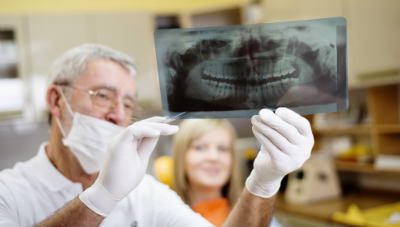TMJ, short for Temporomandibular joint and disorders, is the general term for disorders which cause dysfunction around the jaw joint. The affected muscles in the area are usually afflicted with pain and discomfort. For most people afflicted with TMJ, the most frequent question they ask is probably “when will my TMJ pain go away?”
How long does TMJ last? The quick answer is that in some cases, the pain only lasts for a short period, counting from a few hours to a few days. Usually, you could deal with it by applying basic first aid treatments. However, it differs from one case to another. In some instances, TMJ lasts longer and surgery could be necessary. Keep reading to find out more about TMJ and what you have to do in order to properly deal with your situation.
Teeth grinding & TMJ pain can be relieved if you use the correct smart technology pillows that minimize the pressure on your jaw. They’ll hold your head & neck in the right position and relieve the pain.
You can get the #1 rated TMJ relief pillow here or read our full article about the best TMJ pillows.
Is a TMJ disorder serious?
For most cases, pain associated with TMJ could be relieved by nonsurgical treatments. Especially if the intensity of the pain does not cause extreme discomfort, it could be managed by self-care.
However, if your pain takes place from time to time, particularly if there are physical movements or external factors that cause it to occur, it is highly advisable to seek attention from a medical professional. Similar to other medical conditions, the best step you could take is to get immediate professional advice.
How long could a TMJ pain last?
The duration of discomfort around the TMJ area varies depending on the underlying cause of the disorder. In other words, the time that pain in TMJ would last, remain or reoccur is associated with what brings it about. Acute TMJ symptoms could linger from a few hours to more than one week. If an injury has caused the discomfort, it could mean that until the injury is properly and completely treated, TMJ pain could linger. In some cases, a chronic TMJ diagnosis would mean that the episodes of extreme painful sensation can persist from months to years on end.
How long could a TMJ pain last after dental work?
In some cases, having a dental work could bring about pain in the TMJ. In fact, pain in the jaw is common after dental work for people who are clinically diagnosed with TMJ. A lengthy open-mouth dental surgery is one of the main causes of TMJ pain. The primary issue here is the amount of time the dental procedure takes where the mouth is forced to remain open. Since pain in the TMJ is a case-to-case basis, no constant or particular amount of time could be said to answer in general how long it could take for a TMJ to last after a dental work.
How long do TMJ flare ups last?
In general, flare-ups could linger for a few days, more than a week, up to even less than a month. When a pain in TMJ flares up, the duration of which it takes to relieve the pain varies according to how the pain is associated with the extent of the disorder. Taking medications or applying self-care after a flare-up could significantly reduce the level of your pain and the amount of time it remains painful.

Is a disorder in the temporomandibular joint anatomy curable?
Yes. Unless the underlying cause of your pain, though unlikely, is deemed and diagnosed to be impossible to be cured, a disorder in the temporomandibular joint anatomy is curable. Medical procedures such as dental X-Rays, CT scan and MRI could determine the cause and severity of the disorder in order to determine the treatment process.
TMJ arthroscopy could also be done, wherein an arthroscope is carefully inserted in the joint area to get a better view and diagnosis.
In general, your primary concern is to determine the causality of the underlying problem to completely get rid of the disorder and the pain it is causing.
How can I relieve my TMJ pain?
In some instances, the pain associated with TMJ disorders could go away even without applying any treatment. To a certain extent, your body is designed to recover itself and relax the muscles in the jaw.
However, when the pain is causing you extreme discomfort and it is already affecting and interfering with your daily activities, there are some options to relieve the pain.
Different ways to relieve TMJ pain
1) Taking pain medications
One quick way to alleviate the pain you are feeling is by taking pain relievers. Anti-inflammatory drugs could be helpful in this manner.
If low dosage drugs only make a slight difference in the pain level, doctors may prescribe stronger doses of pain management drugs in order to deal with the pain. For instance, tricyclic antidepressants are known to relieve pain when taken in low doses.
If your TMJ is being caused by muscle spasms, your physician may prescribe you with muscle relaxants. Note, however, that taking medications to deal with the pain does not deal with TMJ entirely if the root cause is not addressed.
2) Practicing physical therapy
Aside from taking medications to deal with the pain, another option to deal with TMJ is by going through physical therapy.
Practicing massages and exercises around the area could prove to be helpful in dealing with TMJ through strengthening the muscles in the jaw. Application of moist heat or ice could be done as well. Some have found applying a warm towel over the affected area to be helpful. When the underlying cause of your TMJ disorder is teeth clenching, your doctor may prescribe you with using mouth guards or oral sprints; a small device inserted in the mouth to wrap around the overall teeth area.
Relieving muscle pressure through acupuncture is another option. In most cases, physical therapies are considered to be a safer option compared to taking pain medications since the latter could have negative side effects when taken constantly in a long-term treatment.
3) Undergoing surgery
When basic medical and physical treatments are not enough to resolve the problem, your doctor may prescribe undergoing surgery to completely address your TMJ disorder.
The type of surgery will depend on the severity of the underlying concern and the affected jaw muscle. In some cases, corticosteroid shots are injected to patients who suffer from severe, unbearable pain.
While it may seem like a huge leap from taking pain medications, undergoing surgery could be your best option if your physician will deem it necessary. Instead of taking band-aid, quick-fix solutions just to resolve the pain, the best way to deal with TMJ disorders is to deal directly to its root cause.
What happens if a TMJ disorder is not treated?
A TMJ disorder is a curable illness. According to the U.S. Department of Health and Human Services, over 10 million Americans suffer from this condition. However, despite being common, when facing a severe TMJ disorder, not undergoing treatment could bring worse effects in the long run.
Failure to seek medical treatment when dealing with a chronic pain in the jaw area could lead to more damages. If disregarded, TMJ disorders could contribute to the quicker deterioration of jaw muscles, which, in turn, could result in later stages of arthritis and nerve damages.
Can a TMJ disorder clear up on its own?
Yes. In some cases, if you can bear with the pain, discomfort from the TMJ could eventually clear up on its own. If the pain is not severe and only recurs in rare occasions, pain in the TMJ could be left untreated. Rest, relaxation and simple jaw exercises could reverse the problem with TMJ.

Frequently Asked Questions
Does TMJ show up on an x-ray?
Yes. After checking the external condition of your jaw, your doctor may opt to get a better look through getting an x-ray around the jaw area.
A transcranial radiograph could be helpful in determining the next step towards treatment. CT Scan and MRI of the jaw is also an option to check if the underlying cause of your discomfort lies on the bone structure and joint tissues.
How do I sleep with TMJ?
The best sleeping position would be lying on your back. This means that you are sleeping without putting much pressure on the jaw area. Getting the right TMJ pillow and putting your arms around a position where it does not strain your neck area is crucial in avoiding waking up with a painful jaw.
Do mouthguards help in dealing with TMJ?
Yes. When the underlying cause of your TMJ pain is diagnosed to be teeth grinding and clenching, mouthguards are a very helpful tool to provide relief from the pressure these activities release to your jaw. See my list of top-rated mouthguards if you need help in finding a high-quality product.
Do muscle relaxers help in dealing with TMJ?
In some instances, yes. Muscle relaxants could be prescribed by your physician if the pressure around your jaw area causes you discomfort. The tightening of the muscles around the TMJ can be relieved through taking such medication.
Why does my jaw pain get better and worse?
If you do not have an exact diagnosis of what causes TMJ to flare-up, you are putting yourself in the position to do activities which could accidentally trigger it.
External factors such as stress, abrupt weather changes, or illness are oftentimes overlooked when in fact they could be contributing to the pain around your jaw. In order to avoid getting worse jaw pain, it is crucial to address its root cause.

Conclusion
So, how long does TMJ pain last?
While most cases of TMJ disorders are simple and easy to address, it is important not to disregard it. Like any other medical condition, it could start as a mere annoying pain in your jaw which could eventually lead to something worse if left untreated.
How long your TMJ pain will last would heavily depend on how you deal with it. Having an appointment with your physician about the matter to talk about personalized care would be your best move in dealing with TMJ.

